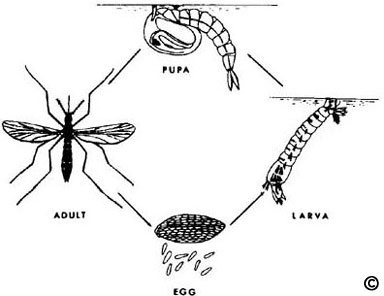Mosquito management is increasingly important, partly due to the West Nile Virus. The best time to manage mosquitoes is when they are in the larval stage. This stage, called wrigglers, lives in shallow water and feeds on microorganisms. They can be found in used tires, wheelbarrows, birdbaths, saucers under pots, ornamental pools and other places that hold standing water. Empty or flush out containers weekly to reduce or eliminate the larvae.
The mosquito-eating fish Gambusia can be released in ponds or other areas that have year-round standing water to control mosquito larvae. Gambusia may be available from your local health department or they may know of a source. Be sure not to release Gambusia in ponds and rivers that have game fish.
Microbial insecticides such as Bti (Bacillus thuringiensis israeliensis) can be effective. Bti is toxic to mosquito larvae but is not hazardous to non-target organisms. Bti may decrease midge populations and reduce fish food supply. In addition to Bti, insect growth regulators such as methoprene interrupt mosquito growth and development, preventing adult emergence. Insect growth regulators do not harm fish or other wildlife but do affect other insects and arthropods.
Use netting and screening to keep adult mosquitoes out of porches, decks and other living areas in the summer. Adult mosquito control in yards is best accomplished with pyrethroid insecticides. “Bug zappers” do not reduce mosquito populations but destroy many desirable natural insect predators. Their use is not recommended.
For more information, see the following Planttalk Colorado™ script(s).


